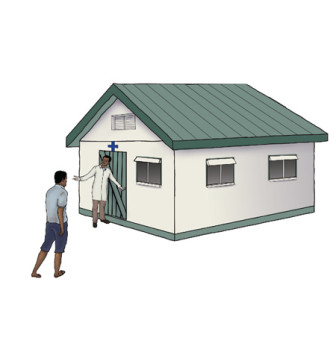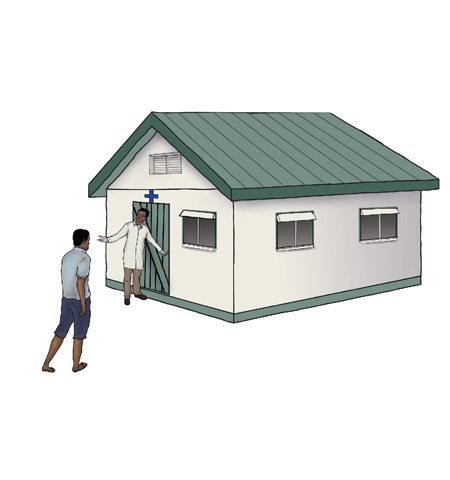
Depiction of a rural clinic by the U.S. Centers for Disease Control.
Nearly two years have passed since the deadliest Ebola outbreak burned through West Africa, claiming the lives of over 11,000 and infecting upwards of 28,000 people. The countries hit hardest were Guinea, Liberia, and Sierra Leone.
The outbreak has died down significantly. Liberia was declared Ebola-free for a second time in September, and Sierra Leone is going into its sixth week with zero reported cases, it is set to be declared Ebola free on November 7th. However, the three countries are interconnected and just one case in one village can threaten the stability and health of the entire region. In the week leading up to October 25, WHO reported three new confirmed cases in Guinea, where roughly two years ago a young boy, Emile Ouamouno, was the first to reportedly die from the virus in the rural village of Meliandou.
Just because sick people are no longer overflowing hospitals and pouring into the streets does not mean that the health crisis is over, say health experts. And just as health workers and governments need to remain vigilant in stamping it out, journalists should be thorough and remain engaged even after the headlines have changed and the cameras have disappeared.
Western journalist Ashoka Mukpo spent two years in Monrovia, the capital of Liberia, prior to the outbreak. When the crisis unfolded he found himself right in the center: as a freelance journalist reporting on the outbreak, as a local producer and camera operator working for a myriad of international outlets and correspondents, and as a victim. Mukpo came down with the virus in October 2014.
On a panel at the Global Investigative Journalism Conference October 10, Mukpo provided unique insight from his time in Monrovia, as part of a discussion about how journalists can adjust their reporting methodology to better cover the next major health epidemic. Among his tips for colleagues reporting on a health crisis in another country:
Find the Story When You Get There
It would have been nearly impossible for any Western journalist to arrive in West Africa at the height of the outbreak without having consumed the relentless and sometimes sensationalist news coverage back home. To strengthen your reporting and rid yourself of any predisposed narratives, seek out locals for more than just translation, fixing, or transportation.
Partner with Local Journalists
Contextualize the crisis by partnering with local journalists who are not only members of the society in which you are reporting, but who have also been watching the crisis unfold since day one. The more you know about how the outbreak affects different fabrics of society, the easier it will be to understand why it got so out of control and what can be done to contain it.
Give Local Journalists Credit
Much of the award-winning reporting that came out of the outbreak would not have been possible without the help of local journalists. Give credit where credit is due.
Be Skeptical of “Heros”
Mukpo saw international correspondents parachute in with narratives that the international responders were heroes, and the Liberians were victims that needed rescuing.
To an American audience, he thinks the term ‘Ebola doctor’ would yield an image of a white person, trained in the West, working for Médecins Sans Frontières (MSF), also known as Doctors without Borders.
MSF is believed to be the first organization to respond to the outbreak, and came to be known as the dedicated entity in fighting the disease. “There is no question that MSF was in front of the outbreak before it happened,” Mukpo acknowledged. “They did remarkable work and took incredible risks.”
In March of 2014, MSF declared the outbreak as ‘unprecedented,’ and pleaded with the international community for help. “They raised the international alarm when the World Health Organization wasn’t doing a good enough job in getting the political wheels moving to deploy resources.”
But come September, in an effort to protect its health workers, MSF made the controversial decision to stop inserting IV lines into patients at clinics in Monrovia.
Ebola patients can lose as much as 10 liters of fluid a day, due to vomiting and diarrhea, often times arriving at health clinics dehydrated with electrolyte and metabolic abnormalities. According to those in the medical field, aggressive intravenous volume repletion is critical in treating someone with Ebola.
Mukpo shared this information with international journalists, hoping that if it made headlines around the world it might force MSF to reinstate its IV program. “Western journalists weren’t interested in that story,” he said. “They already knew what they wanted to cover.”
Eventually, MSF reinstated its IV program, but it would be difficult to know how many Liberians died as a result of their decision to temporarily eliminate it. As a journalist reporting on a health crisis, Mukpo says, it is important to hold accountable even those who seem most admirable — the doctors or medical professionals working tirelessly to save lives.
 Abby Ellis is a reporter and documentary filmmaker based in New York City, where she covers surveillance, climate change, systematic failures and corruption across a wide-range of platforms. Her latest work can be seen on the documentary series VICE on HBO.
Abby Ellis is a reporter and documentary filmmaker based in New York City, where she covers surveillance, climate change, systematic failures and corruption across a wide-range of platforms. Her latest work can be seen on the documentary series VICE on HBO.
Abby reported on this event as part of the IACC Young Journalists Initiative, a network reporting on corruption around the globe.

